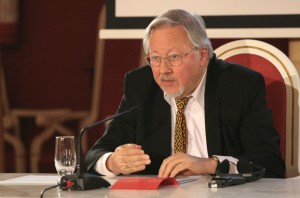
Nineteen years after Lithuania declared independence from the U.S.S.R. Sajudis leader Vytautas Landsbergis remains a potent force on Lithuania's political scene, representing the country in the European Parliament and holding a senior post in the Homeland Union Party, which he founded. Photo by Nathan Greenhalgh.
VILNIUS — Vytautas Landsbergis, a founder of Lithuania’s independence movement from the U.S.S.R. is sharply critical of a recent poll showing declining support for the switch from communism to democratic capitalism.
Along with 34 artists and intellectuals, the music professor turned political activist founded Sąjūdis and became it’s leader, supporting Gorbachev’s glasnost and perestroika policies, coordinating protests against Soviet repression and eventually fomenting the Singing Revolution. Landsbergis became Lithuania’s first president after the country achieved independence from the communist superpower, turning the country to the West and implementing free-market reforms and political freedoms.
Now Landsbergis represents Lithuania as a member of the European Parliament. In an email exchange this week with Baltic Reports, he sharply rebuked the idea that Lithuanians are less supportive of the changes he fought to bring about and questioned the Pew Research Center poll’s validity.
“Very probably, the people are disappointed rather in functioning of democracy here and now, not in the system of values defining democracy,” Landsbergis said. “I wonder if there were any controlling questions.”
The poll showed that support for the switch from communism to democracy and capitalism had declined by 20 and 26 percent, respectively. Regardless of the poll’s accuracy in gauging public opinion, Landsbergis acknowledged that the poll results could spell trouble for the country’s future.
“The results may be worrying as the social decline, the result of the continued world crisis and inherited problems of local governance, is not over yet,” Landsbergis said. “A variety of populist, revengist and eagerly destabilizing trends and forces may seek their own chances at the cost of democracy and the Western political course of Lithuania.”
Landsbergis identifies his old foe, the Kremlin, as one of the biggest threats to Lithuania’s democratic future and stability. At a European Commission-sponsored event to honor the 20th anniversary of the fall of the Berlin Wall Thursday at Vilnius University, Landsbergis called the planned Nord Stream pipeline a new Molotov-Ribbentrop Pact, in reference to the WWII agreement between Nazi Germany and the U.S.S.R. to carve up the Baltic states and Poland.
“The dividing line of Molotov-Ribbentrop did not end, even in 2004 when we joined the European Union. This line could be redrawn … the Gazprom pipeline is going to be guarded by the Russian maritime military. The Russian army, they have already begun huge training exercises called “West” to prepare for the gas line that is not existent,” Landsbergis said. “Berlin is happy with that, they will have profits.”
Landsbergis said countries that approve of the pipeline are “suicidal” and consenting to their own slavery.
“We can only agree that nations that agree to the slavery of others are enslaved,” Landsbergis said. “I heard Vaclav Havel not long ago, and he said ‘politics that treats gas higher than moral values is not only immoral it’s suicidal.’ We do not want a suicidal Germany, nor a suicidal Europe.”












